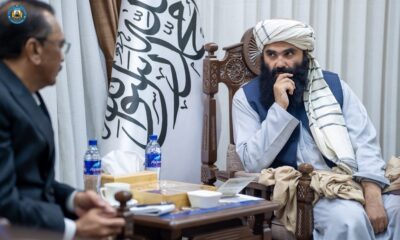Latest News
World leaders band together for Afghan women to have a voice
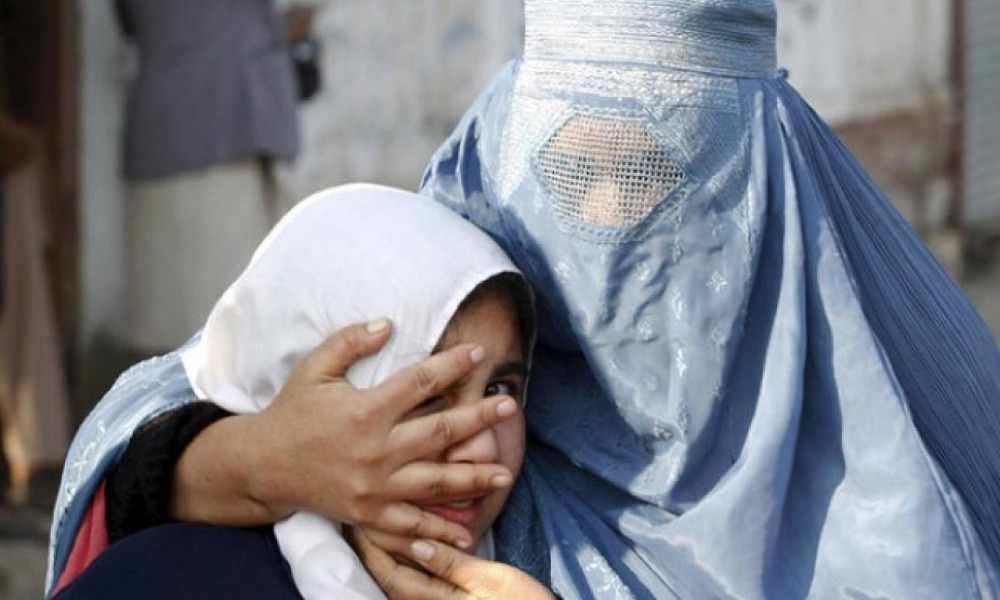
Over 100 formidable leaders from around the world have joined together as signatories to an open letter calling for meaningful participation of Afghan women in the peace process that started in Doha Saturday.
They stated that substantive involvement of women in peace talks makes agreements more likely to be attained and upheld.
Among those who signed the letter, issued by Georgetown Institute for Women, Peace and Security, are Madeleine Albright, Former United States Secretary of State; Sheikh Abdullah bin Zayed Al Nahyan, Minister of Foreign Affairs and International Cooperation of the United Arab Emirates; Laura Bush, Former First Lady of the United States; Angelina Jolie, Special Envoy of the United Nations High Commissioner for Refugees; Hillary Rodham Clinton, Former United States Secretary of State; Ban Ki-moon, Former Secretary-General of the United Nations; and John Kerry, Former United States Secretary of State among others.
In total, 104 leaders signed the letter that called on “all relevant national, regional and international actors to pursue a peaceful, stable Afghanistan by ensuring women’s full participation in the peace process.”
They stated that after 40 years of conflict, there may finally be an opportunity for peace but that the international community has an obligation to assist with ensuring that the peace forged is durable and this opportunity is not squandered.
“As global leaders and foreign policy experts, we have seen clear proof that women’s involvement is key to establishing a lasting and sustainable peace,” the letter read.
“The substantive involvement of women in peace talks makes agreements more likely to be attained and upheld. We have seen evidence of women’s powerful influence in peace processes in recent times, from Colombia to the Philippines.
“The direct impact women’s participation has on ensuring stability makes their inclusion an international security issue, which the UN Security Council recognized when it adopted the landmark resolution on Women, Peace and Security (UNSCR 1325) twenty years ago this fall.”
The letter went on to state that the international community should prioritize women’s meaningful inclusion in order to help obtain the long-term security goals the world has been working towards for decades.
The progress made in Afghanistan since women have begun to be integrated into society was also noted and the Taliban’s ban on girls being educated was raised.
“Women went from being virtually erased under Taliban rule to becoming policewomen, teachers, public officials, mayors and entrepreneurs,” they stated.
In 2019, women accounted for 28 percent of the Afghan parliament – a proportion higher than 67 percent of countries tracked by the World Bank.
“Guaranteeing the preservation of equality, democracy, and inclusivity will promote stability and help to protect future generations from the threat of extremism. Afghanistan, the region, and the world would all be safer as a result,” their letter stated.
Outlining what needs to be done, the group of leaders stated the following:
Given the key role of women in ensuring durable peace, the following measures are necessary:
- Women need to be party to the negotiations, not just an issue to be discussed.
- Women must be involved throughout every step of the process.
- The perspective of women and youth must be reflected in any agreement.
To ensure these goals are met, we call on the international community to do the following:
- Persuade negotiators to preserve equal rights for all its citizens as guaranteed by the Afghan constitution.
- Condition international aid on the preservation of the rights and liberties currently enjoyed by Afghan citizens, especially women’s rights.
- Implement legitimate and established monitoring mechanisms for ensuring the maintenance of rights. Ensure these mechanisms are outlined in the peace agreement and that women are part of the development, implementation and monitoring of such mechanisms.
The full list of signatories is as below:
Karen AbuZayd, Commissioner of the UN Inquiry on Syria and Former Commissioner-General of UNRWA
- María Elena Agüero, Secretary-General of the Club de Madrid
- Shamshad Akhtar, Former UN Under-Secretary-General and Executive Secretary of ESCAP
- Sheikh Abdullah bin Zayed Al Nahyan, Minister of Foreign Affairs and International Cooperation of the United Arab Emirates
- Madeleine Albright, Former United States Secretary of State
- Amat Al Alim Alsoswa, Yemen’s Former Minister for Human Rights, Former UN Assistant Secretary-General and UNDP Assistant Administrator
- Valerie Amos, Former UN Under-Secretary-General for Humanitarian Affairs and Emergency Relief Coordinator
- Mayu Ávila, Former Minister of Foreign Affairs of El Salvador
- Lloyd Axworthy, Former Minister of Foreign Affairs of Canada
- Ali Babacan, Former Deputy Prime Minister of Turkey
- Jan Peter Balkenende, Former Prime Minister of The Netherlands
- Carol Bellamy, Former Executive Director of UNICEF
- Mohamed Benaissa, Former Minister of Foreign Affairs of Morocco
- Catherine Bertini , Former Executive Director of the UN World Food Program
- Carl Bildt, Former Prime Minister of Sweden
- Julie Bishop, Former Minister for Foreign Affairs of Australia
- Irina Bokova, Former Director-General of UNESCO
- Lakhdar Brahimi, Former Minister of Foreign Affairs of Algeria and UN Special Envoy for Afghanistan
- Gro Harlem Brundtland, Former Prime Minister of Norway
- Laura Bush, Former First Lady of the United States
- Margaret Chan, Former Director-General of the World Health Organization
- Helen Clark, Former Prime Minister of New Zealand and Administrator of UNDP
- Joe Clark, Former Prime Minister of Canada
- Sean Cleary, Chief Director of the Office of the Administrator General of Namibia
- Hillary Rodham Clinton, Former United States Secretary of State
- Kathleen Cravero, Former UNDP Assistant Secretary-General for Conflict Prevention and Recovery
- Staffan de Mistura, Former Under Secretary-General and UN Special Envoy to Iraq, Afghanistan, and Syria
- Isabel de Saint Malo, Former Vice President of Panama
- Erik Derycke, Former Minister of Foreign Affairs of Belgium
- Rut Diamint, Chief of Cabinet and Advisor to the Argentine Ministry of Defense
- Lamberto Dini, Former Prime Minister of Italy
- Paula J. Dobriansky, Former United States Under-Secretary of State for Global Affairs
- Alexander Downer, Former Minister for Foreign Affairs of Australia
- Mikuláš Dzurinda, Former Prime Minister of Slovakia
- Jan Eliasson, Former Deputy Secretary-General of the United Nations and Minister for Foreign Affairs of Sweden
- María Fernanda Espinosa, Former Minister of Foreign Affairs and Minister of National Defence of Ecuador
- Christiana Figueres, Former Executive Secretary of the UN Framework Convention on Climate Change
- Joschka Fischer, Former Minister of Foreign Affairs and Vice-Chancellor of Germany
- Louise Fréchette, Former Deputy Secretary-General of the United Nations
- Robert Gates, Former United States Secretary of Defense
- Rose Gottemoeller, Former Deputy Secretary-General of NATO
- Dalia Grybauskaitė, Former President of Lithuania
- Rebeca Grynspan, Ibero-American Secretary-General and Former Vice President of Costa Rica
- Geeta Rao Gupta, Former Deputy Executive Director of UNICEF
- Stephen Hadley, Former United States National Security Advisor
- Chuck Hagel, Former United States Secretary of Defense
- Lord William Hague, Former Foreign Secretary of the United Kingdom
- Tarja Halonen, Former President of Finland
- Ameerah Haq, Former UN Under-Secretary-General for the Department of Field Support
- Stephen J. Harper, Former Prime Minister of Canada
- Noeleen Heyzer, Former Under-Secretary-General of the United Nations
- John Howard, Former Prime Minister of Australia
- Toomas Hendrik Ilves, Former President of Estonia
- Igor Ivanov, Former Foreign Minister of Russia
- Atifete Jahjaga , Former President of Kosovo
- Angelina Jolie , Special Envoy of the United Nations High Commissioner for Refugees
- Medhi Jomaa, Former Prime Minister of Tunisia
- Ivo Josipović , Former President of Croatia
- Marina Kaljurand, Former Minister of Foreign Affairs of Estonia
- John Kerry, Former United States Secretary of State
- Rima Khalaf, Former UN Under-Secretary-General and Executive Secretary of ESCWA
- Ban Ki-moon, Former Secretary-General of the United Nations
- Aleksander Kwaśniewski, Former President of Poland
- Rachel Kyte, Former Special Representative of the UN Secretary-General for Sustainable Energy for All
- Zlatko Lagumdžija , Former Prime Minister of Bosnia and Herzegovina
- Tzipi Livni, Former Foreign Minister, Vice Prime Minister, and Minister of Justice of Israel
- Jessie Rose Mabutas, Former Assistant President of the International Fund for Agricultural Development
- Peter MacKay, Former Minister of Foreign Affairs and Minister of National Defence of Canada
- Susana Malcorra, Former Minister of Foreign Affairs of Argentina
- Purnima Mane, Former UN Assistant Secretary-General and Deputy Executive Director of UNFPA
- Mara Marinaki, EEAS Principal Advisor on Gender and on the Implementation of UNSCR 1325 on Women, Peace and Security
- Cindy McCain, Chair of the McCain Institute Board of Trustees
- Sir Donald McKinnon, Former Deputy Prime Minister and Minister of Foreign Affairs of New Zealand
- Monica McWilliams, Former Chief Commissioner of the Northern Ireland Human Rights Commission and Signatory to the Northern Ireland Good Friday Peace Agreement
- David Miliband, Former Foreign Secretary of the United Kingdom
- Laura Chinchilla Miranda, Former President of Costa Rica
- Amr Moussa, Former Secretary-General of the Arab League and Minister of Foreign Affairs of Egypt
- Marwan al-Muasher, Former Minister for Foreign Affairs and Deputy Prime Minister of Jordan
- Roza Otunbayeva, Former President of Kyrgyzstan
- Ana Palacio, Former Minister for Foreign Affairs of Spain
- Leon Panetta, Former United States Secretary of Defense
- George Papandreou, Former Prime Minister of Greece
- Colin L. Powell, Former United States Secretary of State and Chairman of the Joint Chiefs
- Anders Fogh Rasmussen, Former Prime Minister of Denmark and Secretary-General of NATO
- Òscar Ribas Reig, Former Prime Minister of Andorra
- Condoleezza Rice, Former United States Secretary of State
- Malcolm Rifkind, Former Secretary of State for Scotland, Defence Secretary, and Foreign Secretary of the United Kingdom
- Lord George Robertson, Former NATO Secretary-General and UK Defense Secretary
- Mary Robinson, Former President of Ireland
- Fatiha Serour, UN Deputy Special Representative for Somalia
- Karin Sham Poo, Former Deputy Executive Director of UNICEF
- Natan Sharansky, Former Deputy Prime Minister of Israel and Political Prisoner of the Soviet Union
- Ellen Johnson Sirleaf, Former President of Liberia
- Gillian Sorensen, Former UN Assistant Secretary-General for External Relations
- Cassam Uteem, Former President of Mauritius
- Jozias van Aartsen, Former Mayor of Amsterdam and Minister of Foreign Affairs of the Netherlands
- Hubert Védrine, Former Minister of Foreign Affairs of France
- Ann Veneman, Former Executive Director of UNICEF
- Melanne Verveer, Former United States Ambassador-at-Large for Global Women’s Issues
- Knut Vollebæk , Former Minister of Foreign Affairs of Norway
- Alexandr “Sasha” Vondra, Former Minister of Foreign Affairs and Minister of Defence of the Czech Republic
- Margot Wallström, Former Deputy Prime Minister and Minister for Foreign Affairs of Sweden
- José Luis Rodríguez Zapatero, Former Prime Minister of Spain
- Miomir Žužul, Former Minister for Foreign Affairs of Croatia
Latest News
No destructive groups including Daesh present in Afghanistan: Yaqub Mujahid
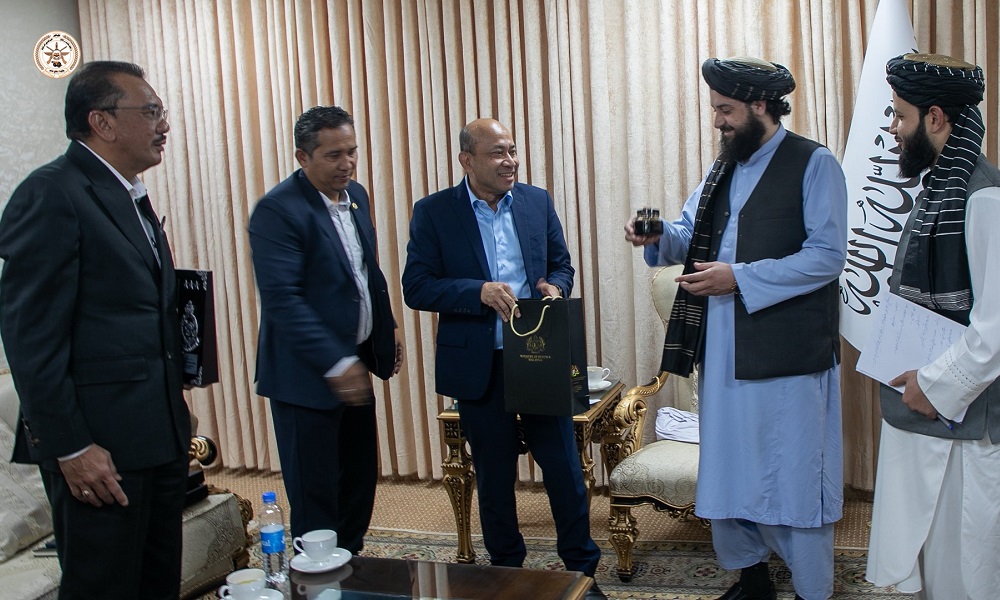
Acting Minister of National Defense Mohammad Yaqub Mujahid has said that no destructive groups including Daesh have physical presence in Afghanistan, adding the Islamic Emirate of Afghanistan (IEA) will not allow anyone to pose threat to any country in the region from the Afghan soil.
Mujahid made the remarks in a meeting with a delegation from Malaysia in Kabul on Thursday.
According to a statement released by the Ministry of Defense, Mujahid highlighted Malaysia’s “good treatment” of Afghan refugees and its long-standing relations with Afghanistan, and said that Malaysia is a powerful Islamic country and visits should increase.
He added that with the establishment of the Islamic Emirate, occupation and war ended in Afghanistan, and the country is fully secure.
Based on the statement, the Malaysian delegation called Afghanistan a friendly country and while emphasizing on comprehensive cooperation, it assured that what they have seen in Afghanistan will be shared with the authorities of their country.
Latest News
EU allocates 17 million euros to support Afghans on the move
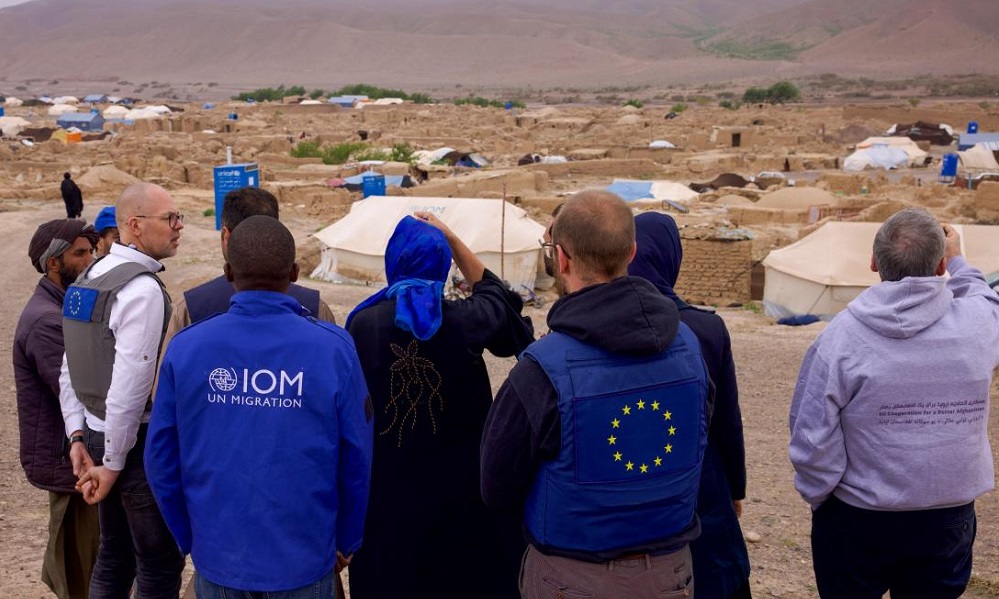
The European Union signed an agreement worth 17 million euros with the International Organization for Migration (IOM) to improve access to basic services, increased economic opportunities and protection for Afghans on the move and their host communities in Afghanistan.
The needs of women and girls are a particular focus of the programme, EU said in a statement released on Thursday.
The statement noted that from January 2023 until April 2024, over 1.5 million Afghans returned from Pakistan and Iran.
“I am deeply moved by the hardship returnees face when being deported to Afghanistan. In a country suffering from poverty and climate change, and in a city that just saw devastating earthquakes, this truly is a crisis within a crisis.”, said Peteris Ustubs, Director for the Middle East, Asia and Pacific of the European Commission’s Department for International Partnerships during the signing ceremony at the IOM transit centre in Herat.
Raffaella Iodice, EU Chargée d’Affaires a.i. to Afghanistan, added “The solidarity of the Afghan people towards their brothers and sisters is an inspiration. We must assure that communities hosting and helping new arrivals are supported. The partnership with IOM ensures access to essential services and provides protection for Afghan returnees and their host communities. As women and girls can be particularly affected, we make sure that all members of society can benefit”.
“IOM’s continued partnership with the EU has been critical in enabling our teams to reach hundreds of thousands of Afghan returnees and other vulnerable communities in the country”, said IOM Afghanistan Chief of Mission, Maria Moita. “Thanks to this renewed commitment, we will be able to focus on addressing the immense challenges in the areas of return and contribute to reintegration, social cohesion, and longer-term solutions for those communities.”
This additional contribution is part of a 5-year programme that is being implemented across Afghanistan and in four countries in the region. It builds on the EU’s previous support to IOM to improve the wellbeing of Afghans forced to return to the country, EU said.
Latest News
Malaysia vows to share its experiences on cyber security with IEA
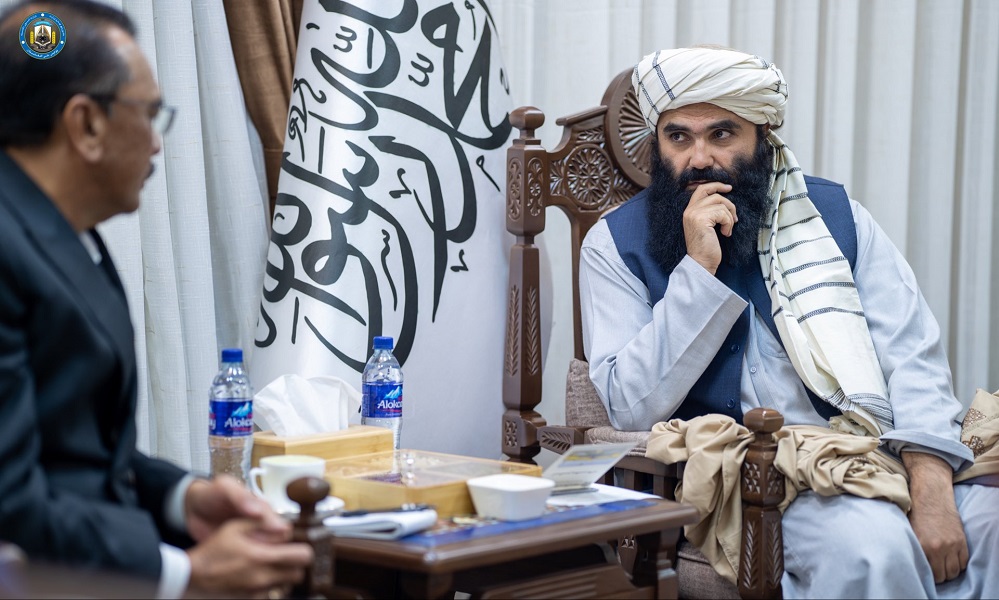
Acting Minister of Interior Affairs Sirajuddin Haqqani has said in a meeting with a delegation from Malaysia in Kabul that Malaysia is an advanced country and that Afghanistan should use is experiences.
According to a statement released by the Interior Ministry, Haqqani, in the meeting on Thursday, emphasized that security is ensured in Afghanistan and unity among Afghans has been restored.
He stated that the Islamic Emirate wants to have close relations and engagement with the world, especially Islamic countries.
The Malaysian delegation consists of representatives of the Ministries of Interior and Defense, and advisers of the Prime Minister’s Office.
According to the statement, a member of the delegation provided information about Malaysia’s capabilities in cyber security and tackling cyber crime, and said that Malaysia will share its experiences in this field with the Islamic Emirate.
In the meeting, the two sides also discussed the fight against drugs, police training, bilateral cooperation and exchange of experiences between Malaysia and Afghanistan.
-

 Latest News3 days ago
Latest News3 days agoRashid Khan named AWCC’s brand ambassador
-

 Regional4 days ago
Regional4 days agoIranian president lands in Pakistan for three-day visit to mend ties
-

 Climate Change5 days ago
Climate Change5 days agoMassive river flooding expected in China, threatening millions
-

 Sport4 days ago
Sport4 days agoKolkata beat Bengaluru by one run in IPL as Kohli fumes at dismissal
-

 Sport4 days ago
Sport4 days agoACL: Aino Mina 3-0 Istiqlal Kabul; Attack Energy 3-0 Khadim
-

 Climate Change4 days ago
Climate Change4 days agoRescuers race to reach those trapped by floods in China’s Guangdong
-

 Business5 days ago
Business5 days agoAfghanistan, Kazakhstan to hold joint expo in Kabul
-

 World3 days ago
World3 days agoMalaysian navy helicopters collide in mid-air, 10 killed












